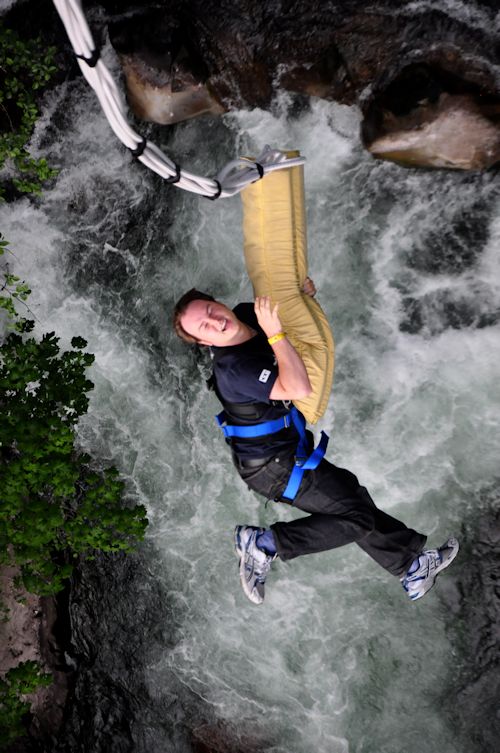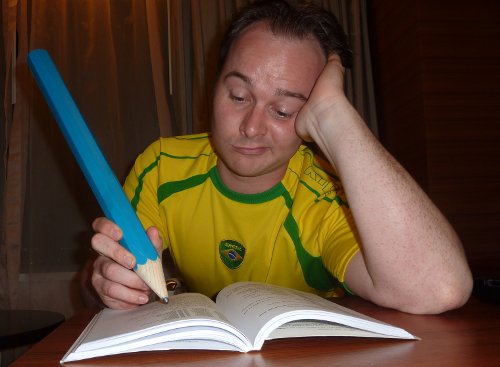Can you become multilingual even if you don’t like learning languages? Posted by Transparent Language on Aug 5, 2013 in Archived Posts
Hi there! My name is Benny Lewis, and I’ve been travelling the world for ten years straight, and have lived in 23 different countries so far, picking up their interesting customs and of course learning their languages.
But there’s a catch! Even though I have a C2 diploma in Spanish, have worked as a professional freelance translator from French, made hundreds of videos in dozens of languages while in those countries, and actually spend about half of the year learning a new language full time… I don’t actually like learning languages!
This is of course, quite an oddity! When you find well known language learners in books or online, their story tends to be one where they promote the beautiful process of learning the language, which they have been passionate about their whole lives. Take your time, appreciate the journey, use it when you feel ready, or the more traditional academic concept of don’t you dare sully the language by using it before you have mastered its grammar!
Today I want to present the controversial point of view that maybe, just maybe, those of us who don’t like learning languages have a huge advantage over those who do.
A means to an end
I barely passed languages in school (I studied both German and Irish/Gaeilge), and even managed to live in Spain for six entire months without being able to say more than just the basics, so I’m as far as you can get from the naturally talented or someone who adores the process of language learning.
While I find the idea of doing exercises in course books, studying grammar tables or learning vocabulary lists to be quite tedious, I have one major advantage over those who adore the process of learning languages: I’m an imperfectionist.
What this means is that I really don’t care if I sound like a cultured poet with an IQ of 200 if I were to speak a given language, all I want to do is to communicate in it for whatever I need to do at the time.
I’m not passionate about learning languages, I’m passionate about using them.
I see a language as a means to an end. If I want to know where the bathroom is, then saying “Bathroom where please?” works to me just as well as “Excuse me kind sir, would you trouble yourself as to direct me to the nearest bathroom. Thank you kindly!”
To utter the first phrase, all I essentially do is learn the words and then say them. No grammatical deconstruction and no flowery beautifying additions.
And in doing so as a beginner learner in dozens of countries over an entire decade, I can confirm beyond a shadow of a doubt that you will not frustrate native speakers by doing so, if your body language and personality balance out the awkwardness with a friendly and patient smile. This idea of angering native speakers is a delusion that we tell ourselves to provide a lazy excuse to not use the language.
Fail fast and fail often
So if I don’t like studying my way to speaking the language, what is my strategy then?
Well, the way I see it, if my goal is to speak, why waste time with tertiary activities? I simply speak from day one.
This turns language learning completely on its head for me, and I learn it by using it, rather than learn it to later use it.
So on day one, I will grab a phrasebook, learn the essentials for a couple of hours, jump on Skype or meet up with a native in person and then use them. Will they be wowed by my abilities to debate Kantian philosophy? No. Will I be able to ask what their name is and tell them mine? Why yes, I do believe you can learn this simple dialogue in less than a few hours.
You’ll mess it up with confusing pronunciation and poor conjugation, but ultimately the other person will understand you. If they don’t then it turns out the world won’t end, and you can see why they don’t understand you, fix it and try again.
Rinse and repeat and then you can have some basic conversations.
When you reach a particular barrier, then you will be very passionate about solving this particular problem, and your coursebooks will come in handy to present the solution. Presenting solutions before we even know the problem is much less interesting.
But… grammar!!
This approach is as rich in your ability to actually use the language as it is in its quantity of mistakes. It turns out that if you conjugate your verbs wrong people understand you anyway.
The hardest part of learning a language isn’t its grammar, tones, vocabulary, consonant clusters and writing system, it’s gaining the confidence to actually use what you have. This is all a matter of overcoming your own fears than necessarily learning thousands of words.
You can study a language forever and still have parts left over to learn (there will never be a day when you are 100% ready), or you can use a language now and get used to it and gain confidence in participating in some form of conversations in it.
Once you have this confidence, then if you go back to grammar to tidy up what you have, all those boring tables and lists of conjugations suddenly become fascinating pieces of the puzzle in the full picture of the language that you are already now familiar with. You have the context to attach those rules to something real, which you don’t if you learn grammar rules from the very start.
Learning grammar doesn’t help you speak a language, it only helps you express yourself without grammar mistakes.
Love using the language, not learning it
This is why I tell those of you who, like me, never had that spark of passion for modal verbs, preposition influences on case, conjugations, and endless word frequency lists, to just put those aside and enjoy speaking the language. Studying is not the be all and end all of language learning.
There are dozens of excuses, but not a single valid reason why you shouldn’t start using your language today, no matter who you are or how passionate you are about the learning process itself.

Build vocabulary, practice pronunciation, and more with Transparent Language Online. Available anytime, anywhere, on any device.







Comments:
fid:
Benny,
I spent a year working on my French, and when I went to Quebec, when people heard my efforts in French, they kindly said, “That’s OK, let’s speak English.” My embarrassment shut down my efforts to speak French.
What do you do about that? I felt I WAS inconveniencing them to persist in trying to speak my halting francais.
fid
hans:
@fid insist politely ‘s’il vous plaît, s’il vous plaît, je voudrais apprendre’
Benny Lewis:
@fid Hans said it all! But here are my deeper thoughts on the subject:
http://www.fluentin3months.com/battle/
You need to be persistent. If you give up quickly as soon as they say just “That’s OK let’s speak English” then that’s not really trying is it?
People want to practise English with me all the time. I just sternly say that I’m the one who has travelled the world to speak their language, so I’m not going to budge.
In Quebec they’d appreciate this attitude more than you think. I improved my French greatly there. Even though I arrived with some rustiness on it, people saw how dedicated I was to not slipping into English (even if they suggested it), so I only spoke French the entire time.
Thienkhanh:
That’s the problem many people’ve been stuck in….
Thienkhanh:
I feel hard when I try to find proper words to fix my context of speaking or writing…And also, expressing some thoughts with my intention seems to be very difficult for me if it does not fall into the regular structure…
JohnJ:
Wow, I couldn’t agree more! I have been living in Portugal for a while with my family. We got here not knowing a single word. What I have learned was learned initially out of necessity, to function and survive, and also from curiosity and the desire to know these interesting people. For instance: ask for directions & understand the response, order something or ask for something at a store/restaurant,etc, get to know someone, understand the news or read instructions…. No one has ever been hard on me as a foreigner here. Although when they can’t understand you it can be frustrating, so you practice!
Chris:
In my opinion, you could but not too deep. You can at least learn the basic but never the core of a language. You still need to learn and understand the language.
Sarah:
Your stance that memorizing grammar is not an effective way of learning a language is supported by Second Language Acquisition experts (Bill Van Patten for example) and language teachers who stay up to date on language acquisition research, the problem is that many language teachers do not stay up to date on that and in addition our education system requires that we be tested on the languages we learn.
Warren Friesner:
First time I tried speaking french to a Frenchman was in a restaurant in Paris, when I dared utter the words “Je voudrais le poulet” to a haughty waiter, who sneered back — “So… you want ze chicken”.
Great article, and kind of what propelled me to develop a conversation-based method, focusing on speaking proficiency, right from day 1.
As Dr. Stephen Krashen has been stating for nearly 40 years on the topic of 2nd language acquisition, grammar that doesn’t emerge naturally as the result of a lot of comprehensible input (conversation or pleasure reading) over time isn’t really available for error correction anyway when you’re talking to someone (it’s in some memory compartment)– the time frame to use it is generally too compressed, and when it is available, as Benny says, it just beautifies/tidies up things rather than make them more meaningful.
On the other hand, having a strong desire to understand and be understood… to actually communicate encourages your partner to speak slower, more clearly, use hand gestures, pick up things, etc….whatever is necessary really, so that the sounds you’re hearing (and speaking hopefully) begin to gain some meaning, even if it’s a bit fuzzy at first.
My best example of language learning comes from how I learned to speak tolerable Spanish.
I used to practice law at a Personal Injury firm. Many of my clients spoke no English. (they were older Cubans).
Because they tended to have similar physical injuries and complaints the Q &A was somewhat repetitive. While I initially used an interpreter, after about a year and a half or so, I was able to converse with them directly.
In fact I once caught an interpreter making a mistake during a deposition (client said “estaba manejando en la lina”, meaning “I was driving in the lane” (Cubans say it this way), and the interpreter translated “I was driving on the line” because, as an Argentinian, “lina” means line and “senda” means lane. I pointed this disparity out to her and the client was able to clarify.
None of this happened by practicing grammar or memorizing words, and my Spanish is still decent today, though it maybe grammatically imperfect.